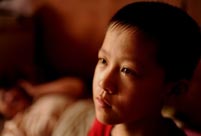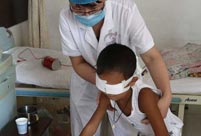Chinese TV cartoons are causing concern among some parents who say they send the wrong messages to impressionable young children. They cite violence, bad language and lack of logic. Li Anlan turns on the tube.
Many parents are relieved that their children are back in school and not sitting in front of television watching cartoons that are violent, illogical, sprinkled with crude language, and send bad messages. Ditto for Internet animation.
The so-called "objectionable" cartoons are relatively mild by Western standards, and some of them contain positive messages, such as environmental protection and the importance of loyalty, determination and team work.
But there are negative elements as well.
Some parents, including those who work and cannot supervise their children, worry about the quality and quantity of the cartoons and fear their children will imitate the worst actions of cartoon characters.
Many children do imitate what they see in TV cartoons, says Song Wei who has taught at Xiaohonghua kindergarten in Shanghai for 32 years.
"Some children are violent both verbally and physically. They hit each other and say things like 'I'm gonna kill you' because that's what they see in animations. Young children cannot distinguish reality with fantasy, and these kinds of programs can be misleading."
Her colleague Qian Yueshui, who has taught for 24 years, says the cartoons use many idioms and slang that make it difficult for children to learn proper Mandarin.
"There aren't many good Chinese animations on TV now," she observes.
The objectionable works are mostly Chinese, avidly consumed by uncritical young children who can't yet distinguish between good and bad influences, parents and teachers say.
The cartoons are aired on CCTV, the state television station, and many other local channels. "After watching 'Boonie Bears' for two years, my son sometimes tells me to 'go to hell' and 'go die'," says high school teacher Wang Yongqin.

 Mountain of garbage in Nairobi
Mountain of garbage in Nairobi Highlights of MAKS 2013 Int'l Aviation and Space Show
Highlights of MAKS 2013 Int'l Aviation and Space Show  10th China-ASEAN Expo opens in Nanning
10th China-ASEAN Expo opens in Nanning Eagle Boy takes to sky to break another record
Eagle Boy takes to sky to break another record 12-year-old boy becomes pillar of the family
12-year-old boy becomes pillar of the family Police name attacker who took boy's eyes
Police name attacker who took boy's eyes Top 10 naked hotels in the world
Top 10 naked hotels in the world The most gorgeous Chinese women in the eyes of foreigners
The most gorgeous Chinese women in the eyes of foreigners A collection of bizarre rooftop buildings around China
A collection of bizarre rooftop buildings around China Putin intimate contacts with marine animals
Putin intimate contacts with marine animals China's frigate 'Bengbu'in fire training
China's frigate 'Bengbu'in fire training Fresh students 'forced' to register in university independently
Fresh students 'forced' to register in university independently 2013 Taiwan Int'l Tourism Expo kicks off in Taipei
2013 Taiwan Int'l Tourism Expo kicks off in Taipei Photo story: Take a gap year
Photo story: Take a gap year Nokia's Global Headquarters: visiting a declining empire
Nokia's Global Headquarters: visiting a declining empireDay|Week|Month